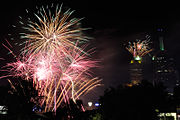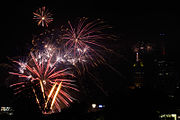Wikipedia:Featured picture candidates/File:NYE melb 2008.jpg
New Year's Eve fireworks display in Melbourne[edit]
|
- Reason
- Happy New Year everyone! This was my first time that I was in Melbourne for NYE and it was pretty crazy - trains were packed to the very brim and all roads were just solid with people! Anyway a high quality photo with good EV - one of my last images of 2008!
- Articles this image appears in
- New Year's Eve, Fireworks, Pyrotechnics
- Creator
- Fir0002
- Support as nominator --Fir0002 00:56, 1 January 2009 (UTC)
- Neutral Looks good, but its got a lot of compression artifacts in the sky and around the fireworks. --Yzmo talk 01:25, 1 January 2009 (UTC)
- Oppose. I think the technical quality is sufficient, but it's on the small side for an FP and composition-wise I think this falls well short of a number of our (technically inferior) fireworks shots (e.g., this or this).--ragesoss (talk) 06:13, 1 January 2009 (UTC)
- Oppose. I know that fireworks are pretty difficult to shoot (and you don't get much time to change your exposure settings) but they look fairly overexposed to be honest as they're missing colour information in the middle. It isn't unavoidable, and generally the fireworks look much nicer, even if the scenery isn't as well lit. I don't have any particularly great fireworks shots myself from a compositional perspective (always difficult to get a good vantage point that isn't swarming with people) but I do have some where the colours are far less washed out, which I think is pretty important with fireworks. Diliff | (Talk) (Contribs) 00:58, 2 January 2009 (UTC)
- Hopefully some of the alts are more pleasing --Fir0002 04:17, 2 January 2009 (UTC)
- Unfortunately not really, as the colour is still pretty washed out by overexposure. What I think probably would have worked better was to stop down the lens a bit more (I used f/13 to f/22 at ISO 100 last time I tried, diffraction isn't really an issue in this sort of photography) and let the exposure go longer. That way the fireworks won't be as exposed as they last for a smaller percentage of the total exposure, but the background will still be exposed fairly well. (Examples: [1] [2] [3]. I know they're not great either and there isn't any interesting background to speak of, but you see the colour of the actual fireworks better, rather than just the glow around them). Ideally there isn't too many fireworks all at once though, as that potentially this means it'll be overwhelmed, so getting the balance right is sometimes really hard as you cannot predict how fast the fireworks will move, how many of them will explode in the next xx seconds, and even where in the frame they will explode. An unforgiving style of photography, to be sure. ;-) Diliff | (Talk) (Contribs) 12:29, 2 January 2009 (UTC)
- Oh and this is just an idea that popped into my head a second ago. If you had the camera really steady on a tripod, you could actually take a frame before the fireworks started, with a much brighter exposure for the background. Then you could blend it with the fireworks frame to get them both exposed nicely. Never tried it before, but I can't see why it wouldn't work. I've got a little program that takes the brightest pixel in a series of images and combines them into one image. Works well for multiple exposures in star trail photography, so you can take sixty 1 minute long exposures to get an hour long star trail without the problems of hot pixels/noise. Only problem is when clouds are moving across the frame. You'll end up with the brightest bits of them all in the final image too which isn't ideal. Diliff | (Talk) (Contribs) 13:25, 2 January 2009 (UTC)
- Unfortunately not really, as the colour is still pretty washed out by overexposure. What I think probably would have worked better was to stop down the lens a bit more (I used f/13 to f/22 at ISO 100 last time I tried, diffraction isn't really an issue in this sort of photography) and let the exposure go longer. That way the fireworks won't be as exposed as they last for a smaller percentage of the total exposure, but the background will still be exposed fairly well. (Examples: [1] [2] [3]. I know they're not great either and there isn't any interesting background to speak of, but you see the colour of the actual fireworks better, rather than just the glow around them). Ideally there isn't too many fireworks all at once though, as that potentially this means it'll be overwhelmed, so getting the balance right is sometimes really hard as you cannot predict how fast the fireworks will move, how many of them will explode in the next xx seconds, and even where in the frame they will explode. An unforgiving style of photography, to be sure. ;-) Diliff | (Talk) (Contribs) 12:29, 2 January 2009 (UTC)
- Hopefully some of the alts are more pleasing --Fir0002 04:17, 2 January 2009 (UTC)
- Oppose While pleasing, I fail to see the encyclopedic value (3b and 5b). It's not a particularly excellent example of fireworks nor an excellent rendition of the Melbourne skyline. Is Fir0002 starting to rest on his laurels?! ;) Madcoverboy (talk) 09:35, 2 January 2009 (UTC)
Not promoted . --John254 00:35, 5 January 2009 (UTC)





